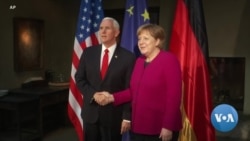Iran says Europe’s efforts to keep the 2015 nuclear deal are failing and there is growing support among the Iranian people to restart the country’s atomic program.
“We appreciate that Europe has done a great deal politically. But it hasn’t been prepared to make an investment. It hasn’t been prepared to pay a price,” Zarif told delegates at the Munich Security Conference Sunday.
He accused the United States and Israel of seeking war with his country.
U.S. Vice President Mike Pence earlier accused Europe of helping to prop up a ‘murderous’ regime in Tehran.
“They have led the effort to create mechanisms to break up our sanctions. They call this scheme a Special Purpose Vehicle, we call it an effort to break American sanctions against Iran's murderous revolutionary regime,” Pence told delegates Saturday.
That Special Purpose Vehicle — officially known as INSTEX — is a payments system designed to allow European companies to trade with Iran and bypass U.S. sanctions, explains sanctions lawyer Nigel Kushner of London-based firm "W Legal."
“The aim is that it will get around the U.S. secondary sanctions by not involving U.S. dollars, not involving U.S. persons, and certainly at the moment only being involved in the procurement of trade which does not include products or services that are sanctioned by the U.S. authorities,” he said.
Europe is hoping that Iran will show patience, adds Kushner.
“I think on the Iranian side, they will play a waiting game and very much hope that next year Donald Trump might not be re-elected,” he said.
But Tehran says Europe’s offer is not good enough.
WATCH: Iran wants more from Europe
“INSTEX falls short of the commitments by the E3 [European three] to save the deal. Europe needs to be willing to get wet if it wants to swim against the dangerous tide of U.S. unilateralism,” Foreign Minister Zarif said Sunday at the Munich conference.
Meanwhile, Vice President Pence’s hard-hitting speech at Munich has triggered fears in Europe that Washington has bigger plans, says Florence Gaub of the European Union Institute for Security Studies.
“Not at all a call for ‘let’s renegotiate the deal’ but rather ‘let’s remove the regime in Tehran.’ And in that sense I think this was not interpreted as anything that Europe could accept,” she said.
Washington, which withdrew from the Iran nuclear deal last year, has not explicitly called for regime change in Iran.











